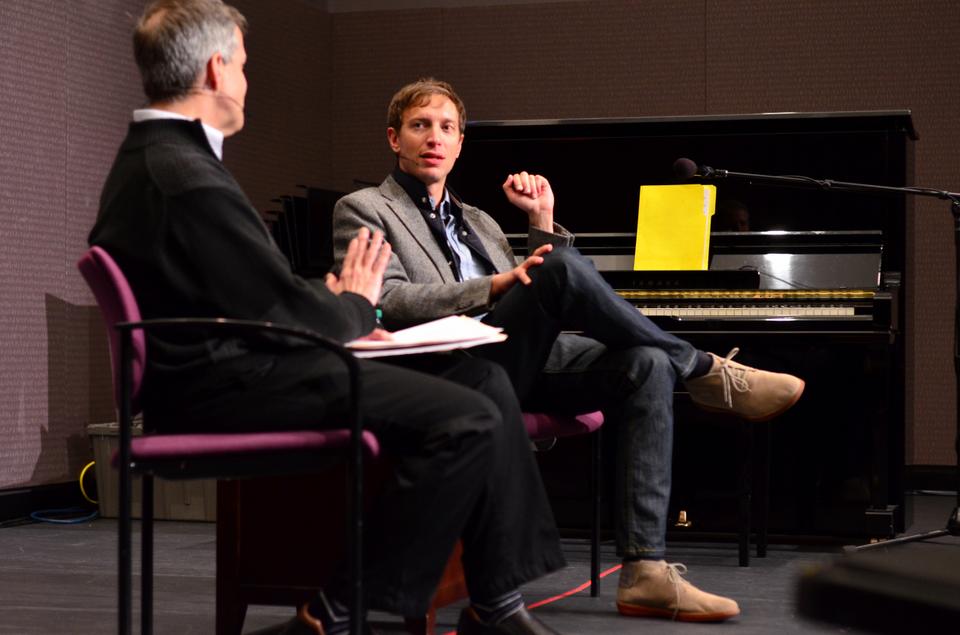
News
Summers Will Not Finish Semester of Teaching as Harvard Investigates Epstein Ties

News
Harvard College Students Report Favoring Divestment from Israel in HUA Survey

News
‘He Should Resign’: Harvard Undergrads Take Hard Line Against Summers Over Epstein Scandal

News
Harvard To Launch New Investigation Into Epstein’s Ties to Summers, Other University Affiliates

News
Harvard Students To Vote on Divestment From Israel in Inaugural HUA Election Survey
Alum Talks ‘Bloody’ Songwriting

“Do you all want to hear an evangelical song or an Occupy song?” asked J. Michael Friedman ’97, the composer and lyricist for the Broadway musical “Bloody Bloody Andrew Jackson,” during a performance and discussion on November 5 in Farkas Hall. While the audience struggled to choose between the equally tantalizing options, Friedman just decided to play both. He began with the “Occupy song,” titled “Consensus is Fucking Hard,” which takes its lyrics entirely from an interview with an Occupy Wall Street protestor. The song addresses the movement’s notorious lack of vision in its opening lines—“What is the message, um, you know, um / I wish I could I could answer that question / I really do / I would like for there to be a message / I think a lot of people are working on that.”
“Consensus is Fucking Hard” exemplifies “investigative theater,” the style in which Friedman works with the New York theater collective the Civilians. The group, which Friedman co-founded, has written and produced musicals about topics including the 1871 Paris Commune, the sex scandal that surrounded evangelical pastor Ted Haggard, and the Atlantic Yards construction project in Brooklyn. Friedman’s work often builds off primary source material—interviews, personal experiences, and, in the case of the aforementioned “evangelical song,” actual emails from Ted Haggard to his Colorado Springs congregation before and after the scandal went public.
Friedman’s songs carry much of the burden of plot exposition in the Civilians’ plays, and as a result his lyrics have to convey a lot of information. “I tend to fit way too many words into a small space,” he said. However, when composing music to accompany such verbose, content-heavy lyrics, Friedman works to create compelling contrasts; for example, “Consensus” is built on a bouncy, vaudeville piano riff that brings out the sheer absurdity of the song’s lyrics.
“I think that songs are better when there’s a little bit of tension,” he said. “Sometimes, the music and the words want to be in total opposition to each other—if the music is happy and the words are sad, or vice versa, for example. In good musicals, there are always two things happening at once.”
Friedman came to musical theater relatively late—he claimed to have not even composed a song until he was 25. A classically trained pianist and cellist, Friedman concentrated in history and literature at Harvard and was a member of the Signet Society, but he did not get heavily involved with theater until he studied under Elizabeth Swados when she was a guest artist on campus. Swados, a well-known lyricist and composer, encouraged Friedman to work on student productions and, later, to get involved with New York’s theater scene. Friedman’s studies at Harvard have since served as a major influence—he drew inspiration for “Bloody Bloody Andrew Jackson” from a course he took on Jacksonian America.
“Bloody Bloody,” Friedman’s best-known show, shares the Civilians’ flair for appropriating and tweaking history: the musical recasts America’s seventh president as an emo rocker but still manages to hit all of his life’s major events, from his upbringing through his controversial presidency. Despite its historical scope, the show retains a zoomed-in focus on Jackson’s personal emotions, which Friedman claimed were eerily compatible with the modern emo movement. “Andrew Jackson is an emo guy because he’s really, really angry about everything for no reason,” Friedman said. “He’s got that constant teenage boy problem.”
“Also, he and his wife were cutters. They would actually ritually cut themselves,” Friedman added.
While largely historically accurate, the show’s songs frequently display an irreverent attitude towards history (see lines such as “James Monroe was a douchebag” and “I’m gonna fill you with populi-jism”). Friedman’s lyrics also reflect present-day America’s complex relationship with Jacksonian ideals—Friedman sees aspects of Jackson in George W. Bush, Barack Obama (“with all the hope-y, change-y stuff,” Friedman said), Sarah Palin, and the Tea Party movement. “At any moment, Jackson is like anything with electoral politics we live with today.... He’s everything about everything you’ve been reading for the past six months,” Friedman said.
Because of the show’s close relationship with the current political landscape and the recent election, Friedman said, he is not surprised at its success. “If you write a show about election cycles during a massive, terrifying election cycle, it turns out everyone will [stage] it,” he said.
In its resonance with contemporary politics as well as its punk rock aesthetic, Friedman said, the show reflects his tendency to take his theatrical subject matter in unconventional directions. “We tried to take a historical legacy and make it contemporary without worrying about it too much,” he said. “You immerse yourself in a world and try to figure out what that world wants the music to be.”
Want to keep up with breaking news? Subscribe to our email newsletter.
